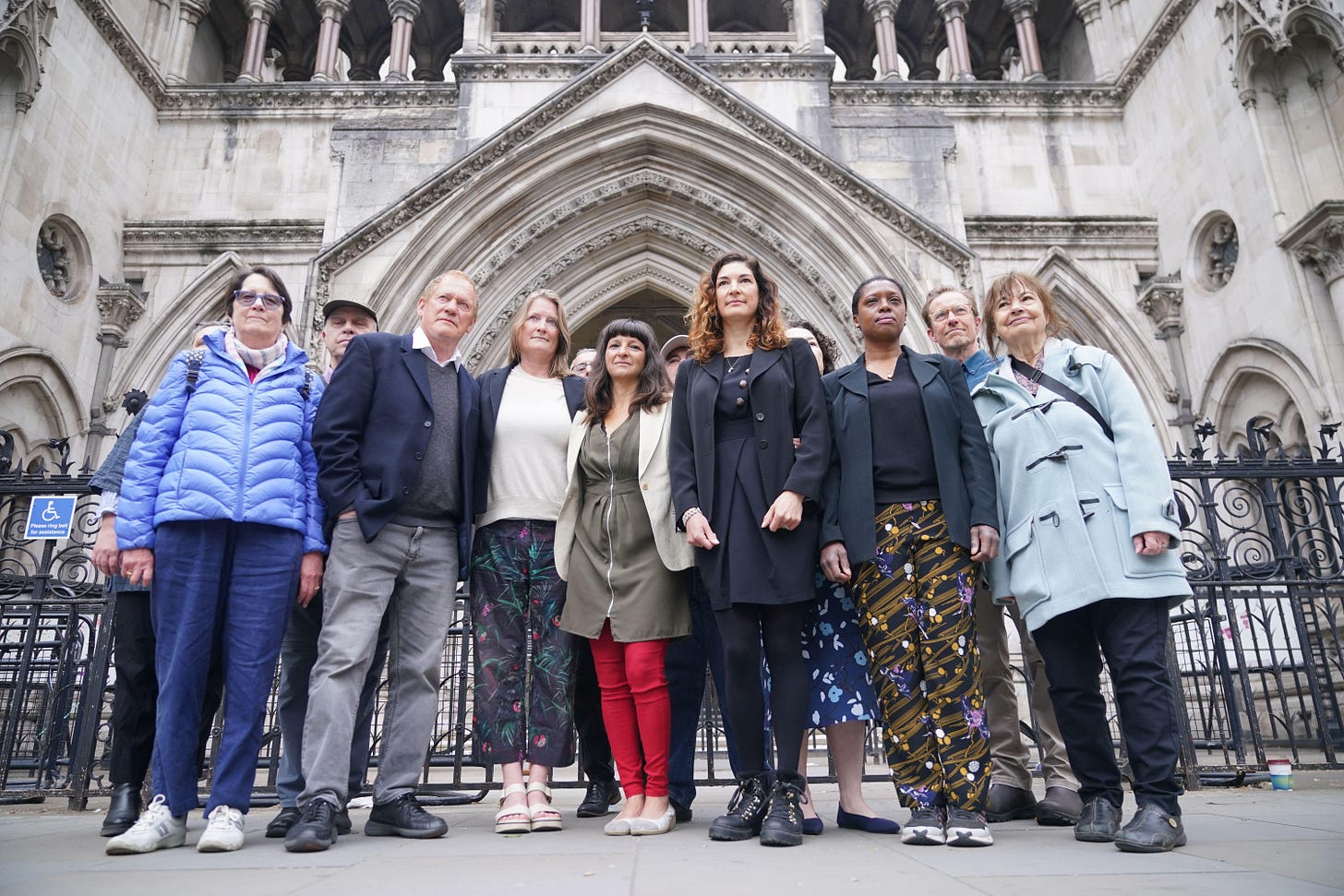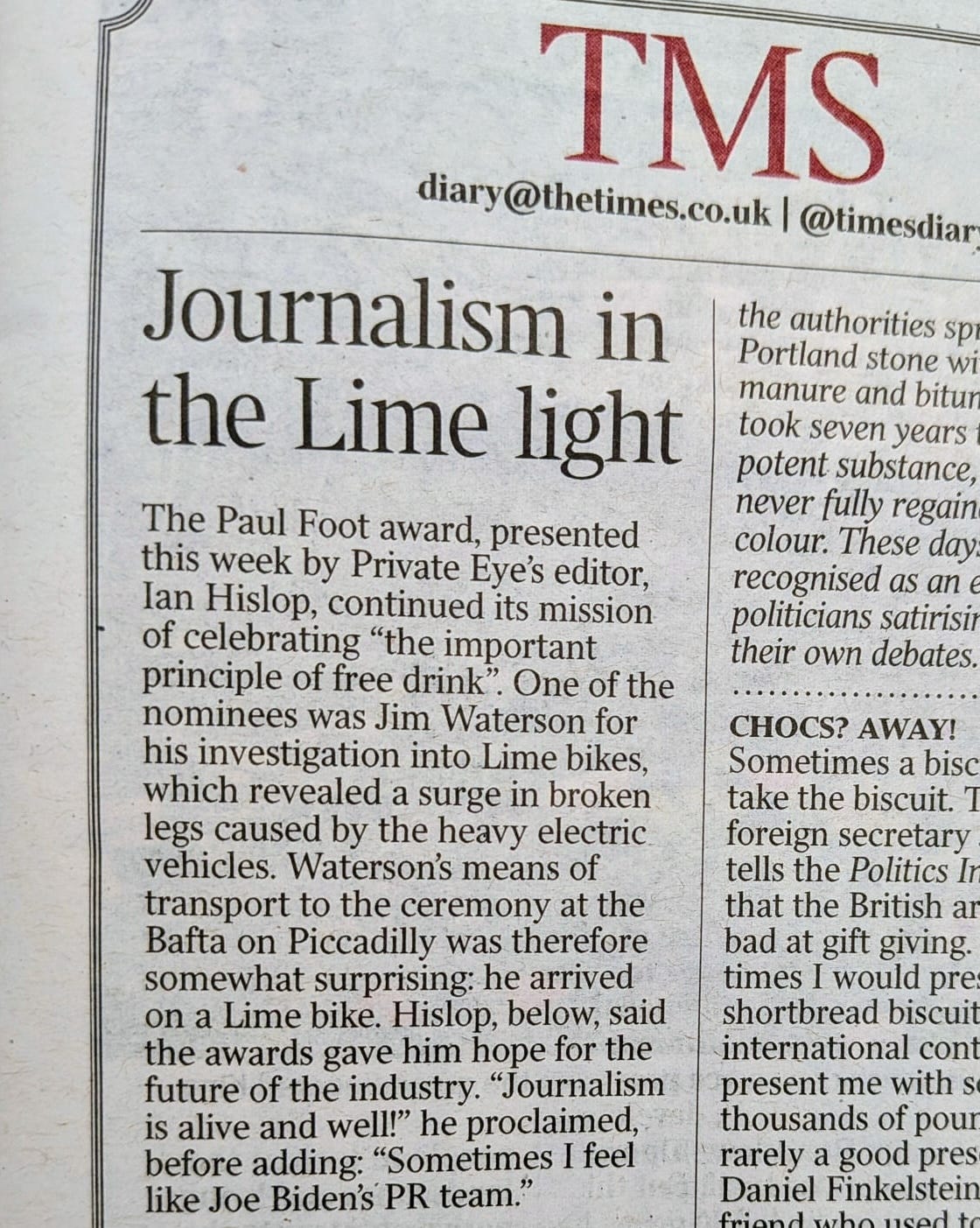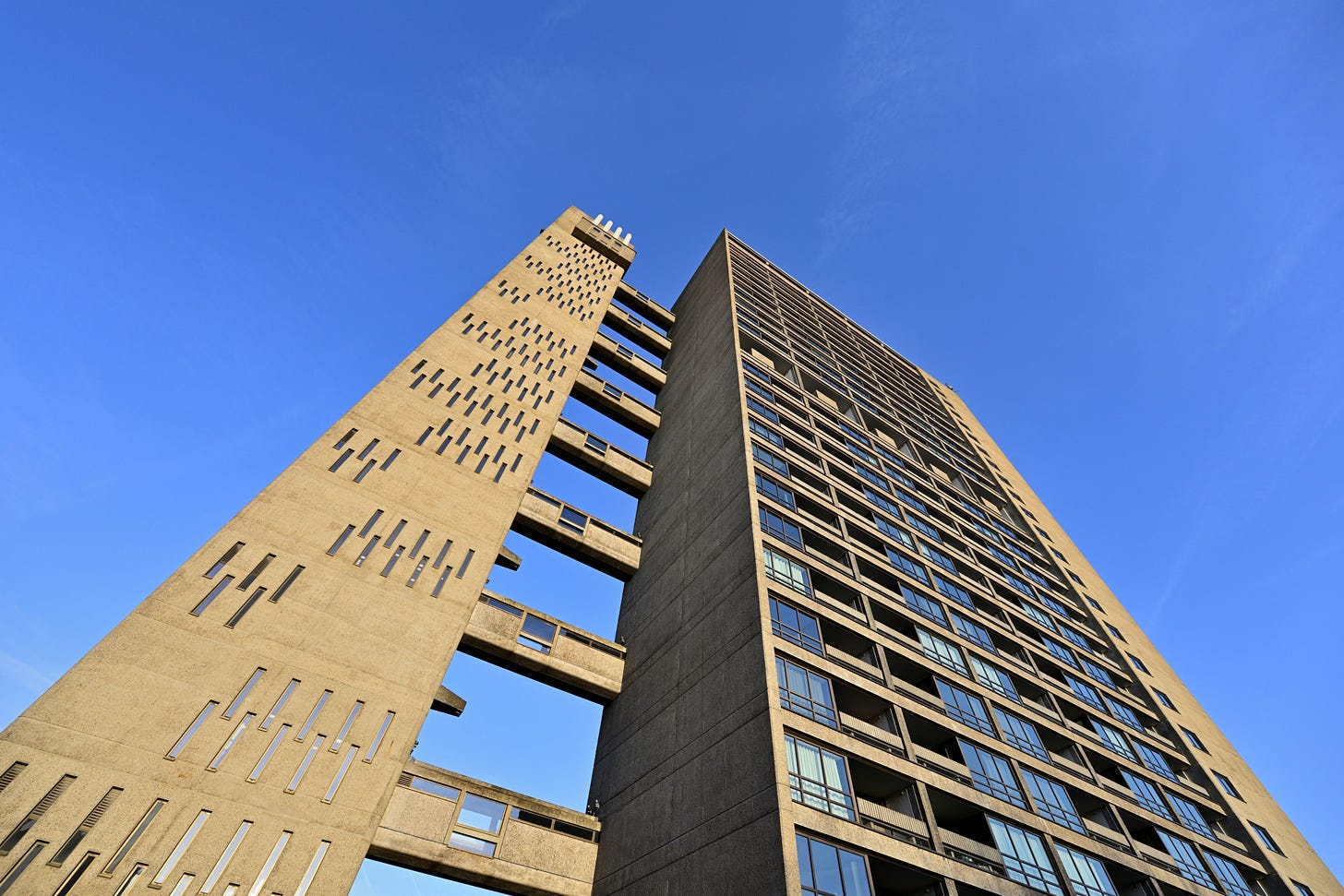A Mighty Fudge: Hoopla approved, just don't ask how
Plus: Preposterous London property of the week, Mudchute City Farm under threat, and the renters trapped in a Ballardian tower block nightmare.
London Centric has covered The Battle for Brockwell Park in depth because it speaks to a series of wider debates over what the capital is and who its public spaces should serve. It’s a topic that takes in the control of neighbourhoods, skint local authorities, an ageing population, messy local politics, house prices, the growing willingness of residents to take their local borough to court if they don’t like a decision, the dearth of free events, private equity moneymaking, and — to borrow the government’s framing of the issue — the highly-loaded question of NIMBYism vs YIMBYism.
Yesterday evening, just 18 hours before the gates open, Lambeth council finally approved an emergency application for permission to build the temporary festival site which has already been built. As a result, we expect the events to go ahead — although we won’t completely believe it until we see the first people arrive at lunchtime.
Whatever happens, we’ll be here to cover the legal fallout. If you’re sick of the whole ongoing saga, you can scroll down for more stories from the capital this week.
Got a story for London Centric? Get in touch via WhatsApp or email, or leave a comment.
London festivals: The party is set to go on as the pro-festival backlash begins.
Sometimes it’s challenging for journalists to level with the public about the limits of what they know. Readers, understandably, want clear and immediate answers. Reality can be messier.
The Battle for Brockwell Park, a high court legal fight over the use of a major London park space for a series of private music festivals, has been a case study in this. After London Centric broke the news on Friday night that a residents’ group opposing the events had defeated the council, some news outlets rushed out headlines suggesting “festivals cancelled”. Then on Monday night the same places published headlines saying “festivals definitely on”, both based on little more than press releases from warring sides.
London Centric does our best to be a bit more nuanced, so with large numbers of readers getting in touch to ask whether the festivals — which include the likes of Field Day, Mighty Hoopla and Cross the Tracks — are happening, we sat in court and actually read the paperwork.
As things stand, there’s little doubt the initial events will take place this weekend, although further legal challenges are still possible. The festival site is completely built. The festival promoters say the events will be going ahead. Lambeth council say the events will happen. With those organisations in alignment it’s hard to see what could stop them.
But on what legal basis are the festival organisers and the council pushing ahead while complying with the high court judgment? Having sat through two days of legal hearings and read a few hundred pages of documents we’ll be honest: we don’t fully understand it and neither do several planning lawyers we spoke to.
The park can only host 28 days of temporary events across a year and the high court judge appeared to insist that at the end of each period the land must revert to its old state. Yet the festival organisers intend to leave a large chunk of the festival site fenced off for a further fortnight once this temporary permission has been used up.
Lambeth, in a lengthy decision notice issued last night, has relied on a fresh legal opinion from a barrister arguing that, so long as the stages that are exclusively required for the commercial events are taken down within the permitted timeframe then the rest of the site — including the fence — can stay up for a couple of weeks longer to host the free Lambeth Country Show under a different set of rules.
This doesn’t seem to fit with the spirit of the high court judge’s suggestion that the park should revert to its natural state at the end of each use. But the fresh legal opinion has been accepted by the planning authority (Lambeth council), the trustees of the park (also Lambeth council), and the organisation that has just agreed to pay the festival organisers £330,000 to host the community event at the site that would be impacted if permission was refused (also Lambeth council).
The Protect Brockwell Park residents’ group is still promising further legal action but there’s not much any environmental campaigner or local resident can do to stop a festival once fans are on site. Then what happens afterwards and in future years becomes a mess that can be sorted out retrospectively, without having to refund any ticketholders.
What’s clear is that various individuals have, at various stages, made serious mistakes with the organisation of these festivals. In the process, they have opened up festivals across the capital and the rest of England to fresh legal challenges. Residents and politicians near north London’s Finsbury Park and east London’s Victoria Park are now seeing if events in their part of London could be curtailed by the judge’s ruling.
The pro-festival counter-revolution is already underway.
Last week’s court ruling unleashed a wall of fury from people across London who support events in parks, or have already bought tickets. An increasing number of people have filled up the London Centric inbox and comments section with complaints about NIMBYs sucking the soul out of London and objecting to wealthier residents who are able to crowdfund legal fees having sway over public spaces. (These complaints are, inevitably, dismissed by campaign groups who feel they are protecting public spaces for all Londoners.)

Some of this has turned personal. Rebekah Shaman, the local plant medicine practitioner who brought the case against Lambeth council on behalf of the campaign group Protect Brockwell Park, has received substantial online criticism online of her environmental credentials while also flying people on healing retreats to the Peruvian Amazon.
In turn, the festival promoters have sent a libel threat to Protect Brockwell Park, demanding they stop claiming the festivals are illegal on social media. The campaigners have responded by accusing the festival promoters of using libel law to shut down public criticism, a type of lawsuit often called a SLAPP.
To complicate matters even further and ensure this is one of the most cursed series of gigs ever arranged in London, Mighty Hoopla and Field Day are facing protests because they are owned by a company that also invests in Israel. At the same time, the headliner of tonight’s Wide Awake festival in the park is Irish rap group Kneecap, a member of which was just charged with a terror offence for waving the flag of Hezbollah, the militant group at war with Israel.
All of the speculation over whether the events will take place has been terrible for sales, it seems, with the organisers of Wide Awake now trying to offload tickets at half price a few hours before the first customers are due to arrive.
Lime squeezed by Ian Hislop
It’s no secret that London Centric has spent a lot of time writing about the risks of Lime bikes, with Private Eye editor Ian Hislop praising our “very good investigation” (part one, part two, part three) at the magazine’s Paul Foot investigative journalism award on Tuesday night.
Hislop said: “It's lucky I wasn't a judge because I was run over by a Lime bike and I’d have given [London Centric] all the money.”
That said, his comments did lead to us being called out in the Times for still riding the vehicles.
Preposterous London property of the week
This twelve bedroom detached house called “Turquoise” in north London has been newly listed for just £20m. It is situated between Highgate and Hampstead on The Bishops Avenue, the favoured street for mysterious overseas owners to buy a London property at vast cost through an opaque corporate structure and then not live in it. Why people do that is known only to them and their accountant.
This property, built in 1914, is Grade II-listed and appears to have interior design based on the theme of “Marie Antoinette-meets-Dubai”. The only furniture in the main reception room is a pink grand piano and a wooden elephant.
London Centric has been able to identify the legal owner of the house as two companies named after the Saudi Arabian city of Jeddah but the individuals who own these companies are hidden behind a further series of off-shore trusts based in the British Virgin Islands and Jersey. Until the government passes a relatively simple law to increase the transparency around property ownership then that’s all you’re ever going to know about the person trying to offload this London property.
High-Rise dystopia: Disabled tower block residents "threatened" for posting about broken lifts on Reddit
Disabled residents were stranded in an iconic London high-rise tower block without any working lifts for a week, amid allegations they have been threatened by the building’s management company for posting about the issue on Reddit.
Business owner Peter Yu and student Vasundhara Gupte are both residents of the 28-storey brutalist Balfron Tower in Tower Hamlets, a high-rise east London tower built by Ernő Goldfinger, a Bond villain namesake. They told London Centric they were part of a group of residents who posted on multiple Reddit forums about how many residents had been unable to leave their homes after both of the block’s lifts broke down on 13th May.
The Balfron Tower is often cited as the inspiration for JG Ballard’s dystopian novel High-Rise, later turned into a film starring Tom Hiddleston. The book depicts how the residents of a tower block descend into anarchy following disputes over, among other issues, the building’s failing lifts. While Ballard’s novel sees the residents resorting to eating their pets while engaging in extreme violence, today’s occupiers of the block say they simply want the management company to take their concerns seriously and help access supermarket deliveries.
London city farm fights council for future
A city farm that allows London children to visit sheep close to Canary Wharf’s skyscrapers has warned that its future is uncertain after a local council declined to renew its long lease. Mudchute City Farm has launched a £75k appeal to sue Tower Hamlets council, the landlord for their site near Canary Wharf on the Isle of Dogs, over its decision not to renew the charity’s previous 20-year lease for the site, which ended last year. Instead, the council has offered a shorter lease and asked the farm to pay rent for the first time in its 50-year history.
The farm has been seeking to secure its long-term future on the site for many years. In 2019, the council – then run by Labour mayor John Biggs – approved a plan to grant the charity a proposed 99-year lease on a peppercorn rent but this never materialised. Current mayor Lutfur Rahman, who belongs to the Aspire party, succeeded Biggs in May 2022 following a series of brutal political and legal battles.
The farm is seeking to raise £75,000 to fund its legal challenge. When asked by London Centric about the high figure, it attributed this to fees for solicitors, who it has worked with during multiple years of lease negotiations, a surveyor, and the cost of hiring barristers for future court action.
A council spokesperson said that despite council policy “for shorter term leases, we have proposed an extended lease length”, emphasising that negotiations for “a new lease that will benefit the community” were ongoing.
London Centric’s reporting is paid for by people who are willing to support traditional, on-the-ground journalism about the capital. If you’re able and willing to become a paying subscriber then your support is much appreciated.
Feedback is always appreciated via WhatsApp or email, or leave a comment.







“sick of the whole ongoing saga” yes, but also glued to watching this slow motion car crash with your excellent coverage.
Honestly would go to Wide Awake if it was not happening on a Friday (my time off is getting tight this year). Brilliant line up, but God, starting at midday! on a working day!